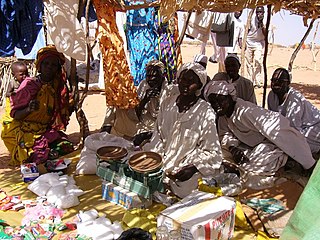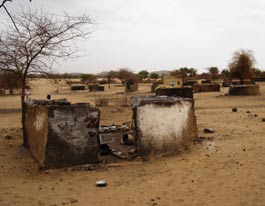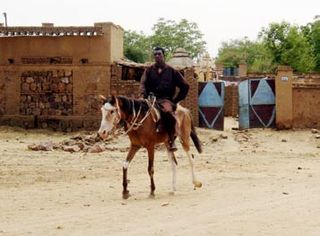
The African Union Mission in Sudan (AMIS) was an African Union (AU) peacekeeping force operating primarily in the country's western region of Darfur to perform peacekeeping operations related to the Darfur conflict. It was founded in 2004, with a force of 150 troops. By mid-2005, its numbers were increased to about 7,000. Under United Nations Security Council Resolution 1564, AMIS was to "closely and continuously liaise and coordinate ... at all levels" its work with the United Nations Mission in Sudan (UNMIS). AMIS was the only external military force in Sudan's Darfur region until UNAMID was established. It was not able to effectively contain the violence in Darfur. A more sizable, better equipped UN peacekeeping force was originally proposed for September 2006, but due to Sudanese government opposition, it was not implemented at that time. AMIS' mandate was extended repeatedly throughout 2006, while the situation in Darfur continued to escalate, until AMIS was replaced by UNAMID on 31 December 2007.

United Nations Security Council Resolution 1564, adopted on 18 September 2004, after recalling resolutions 1502 (2003), 1547 (2004) and 1556 (2004), the Council threatened the imposition of sanctions against Sudan if it failed to comply with its obligations on Darfur, and an international inquiry was established to investigate violations of human rights in the region.

While there is a consensus in the international community that ethnic groups have been targeted in Darfur and that crimes against humanity have therefore occurred, there has been debate in some quarters about whether genocide has taken place there. In May 2006, the International Commission of Inquiry on Darfur organized by United Nations "concluded that the Government of the Sudan has not pursued a policy of genocide ... [though] international offences such as the crimes against humanity and war crimes that have been committed in Darfur may be more serious and heinous than genocide." Eric Reeves, a researcher and frequent commentator on Darfur, has questioned the methodology of the commission's report.

United Nations Security Council Resolution 1679, adopted unanimously on May 16, 2006, after recalling resolutions 1556 (2004), 1564 (2004), 1574 (2004), 1590 (2005), 1591 (2005), 1593 (2005), 1663 (2005) and 1665 (2006) on the situation in Sudan, the Council endorsed a decision by the African Union Peace and Security Council to move ahead with a United Nations peacekeeping force in Darfur as soon as possible.

United Nations Security Council Resolution 1672, adopted on April 25, 2006, after recalling resolutions 1556 (2004), 1591 (2005), 1651 (2005) and 1665 (2006) on the situation in Sudan, the Council imposed travel and financial sanctions on four Sudanese individuals over their involvement in the Darfur conflict. It was the first time sanctions had been adopted against individuals in the region.

United Nations Security Council resolution 1591, adopted on 29 March 2005, after recalling resolutions 1547 (2004), 1556 (2004), 1564 (2004), 1574 (2004), 1585 (2005), 1588 (2005) and 1590 (2005) on the situation in Sudan, the council placed a travel ban and asset freeze on those "impeding the peace process" in Darfur.

United Nations Security Council Resolution 1706, adopted on August 31, 2006, after recalling previous resolutions on the situation in Sudan, including resolutions 1556 (2004), 1564 (2005), 1574 (2004), 1590 (2004), 1591 (2005), 1593 (2004), 1663 (2006), 1665 (2006) and 1679 (2006), the Council expanded the mandate of the United Nations Mission in the Sudan (UNMIS) to include deployments in Darfur to enforce the Darfur Peace Agreement.

United Nations Security Council Resolution 1769, adopted unanimously on July 31, 2007, after reaffirming all resolutions on the situation in Sudan, the Council established the joint African Union – United Nations Hybrid Operation in Darfur (UNAMID) in an attempt to end the violence in Darfur, for an initial period of twelve months.
United Nations Security Council Resolution 1935, adopted unanimously on July 30, 2010, after reaffirming all previous resolutions and statements on the situation in Sudan, the Council extended the mandate of the African Union – United Nations Hybrid Operation in Darfur (UNAMID) for a further 12 months until July 31, 2011 and demanded an end to fighting and attacks on United Nations personnel and civilians.

United Nations Security Council Resolution 1945, adopted on October 14, 2010, after recalling previous resolutions on the situation in Sudan, the Council extended the mandate of an expert panel monitoring an arms embargo and other sanctions on groups that "impede peace in Sudan" until October 19, 2011.

United Nations Security Council Resolution 1590, adopted unanimously on 24 March 2005, after recalling resolutions 1547 (2004), 1556 (2004), 1564 (2004), 1574 (2004), 1585 (2005) and 1588 (2005) on the situation in Sudan, the Council established the United Nations Mission in Sudan (UNMIS) for an initial period of six months.

United Nations Security Council Resolution 1982, adopted unanimously on May 17, 2011, after recalling all previous resolutions on the situation in Sudan, the Council extended the mandate of an expert panel monitoring the arms embargo and other sanctions against the country until February 19, 2012.

United Nations Security Council Resolution 1651, adopted unanimously on 21 December 2005, after recalling previous resolutions on the situation in Sudan, particularly resolutions 1556 (2004) and 1591 (2005), the Council extended the mandate of an expert panel monitoring sanctions against and violations of human rights in the Darfur region until 29 March 2006. It was the last Security Council resolution adopted in 2005.

United Nations Security Council Resolution 1713, adopted unanimously on September 29, 2006, after recalling previous resolutions on the situation in Sudan, particularly resolutions 1556 (2004), 1591 (2005), 1651 (2005) and 1665 (2006), the Council extended the mandate of an expert panel monitoring sanctions against and violations of human rights in the Darfur region until September 29, 2007, and requested the Secretary-General to add another expert to the team.

United Nations Security Council Resolution 1714, adopted unanimously on October 6, 2006, after recalling previous resolutions on the situation in Sudan, particularly resolutions 1590 (2005), 1627 (2005), 1653 (2006), 1653 (2006), 1663 (2006), 1679 (2006), 1706 (2006) and 1709 (2006), the Council extended the mandate of the United Nations Mission in Sudan (UNMIS) until April 30, 2007.

United Nations Security Council Resolution 2003, adopted unanimously on July 29, 2011, after reaffirming all previous resolutions and statements on the situation in Sudan, the Council extended the mandate of the African Union – United Nations Hybrid Operation in Darfur (UNAMID) for a further 12 months until July 31, 2012.
United Nations Security Council Resolution 1779 was unanimously adopted on 28 September 2007.
United Nations Security Council Resolution 1891 was unanimously adopted on 13 October 2009.
United Nations Security Council Resolution 1841 was unanimously adopted on 15 October 2008.

United Nations Security Council Resolution 2138, adopted on 13 February 2014, extended the mandate of the Sudan Sanctions Committee and requesting the committee's panel of experts provide a final report on its findings by January 2015. It noted with regret that armed groups in Darfur persisted in committing violence against civilians, and described an intention to impose further targeted sanctions against those responsible.














